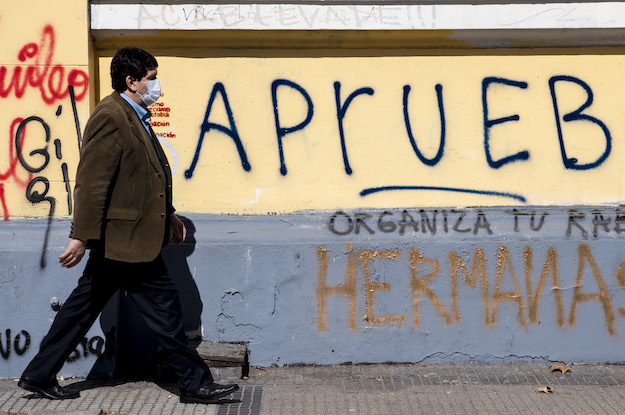AQ asked two prominent Chileans to analyze the upcoming referendum. Click here to read an article from Patricio Navia.
SANTIAGO – There is a lot of hope surrounding the referendum on Oct. 25, when Chileans can choose to reject or approve the start of creating a new constitution. A survey from August found that 41% of respondents considered the referendum an opportunity for change, followed by 19% that associated it with hope and 12% that associated it with uncertainty. Despite the polarization that exists in Chile, it is widely expected that the approve vote will win, setting into motion a highly-anticipated two-year process to replace the constitution of 1980. It won’t be easy, but if the constitutional process is done well, we can regain trust in political institutions and involve more people in politics.
Chile’s current constitution lacks legitimacy. The constitution was created during a cruel dictatorship, and it has a narrow view of how to organize and distribute power, and of what fundamental human rights are guaranteed – especially economic, social and cultural rights. There is a very neoliberal framing to our constitution. For example, Chile is the only country in the world whose constitution has enshrined the private ownership of water. But in addition to a constitution with different content, Chile needs a constitution created through a process that involves citizen participation. This will be the first opportunity in our history for citizens to decide if and how a new constitution will be drawn up.
The path to that outcome is likely to be messy, leading some to argue that Chileans are about to make a big mistake. The options facing voters in October’s referendum are confusing. On the ballot, all voters – those who approve as well as those who reject drafting a new constitution – will be asked to choose between two ways to do so: a mixed convention or a constitutional convention. Both formats would involve electing Chileans to draft a new constitution – by themselves through the constitutional convention or alongside current legislators in a mixed convention. But there’s been significant confusion over the differences between the two options. For example, the constitutional convention would require gender parity among the drafters, but the mixed option would not.
Misinformation in the run-up to the referendum has also complicated the process, giving ammunition to defenders of the status quo. There are campaigns that claim that a new constitution would change peoples’ lives completely. Others argue that nothing would change and no reforms would happen. And while the idea is not widespread, some extreme leftist movements are even claiming that if the approve vote wins by 80% or more, this will be a referendum on President Sebastián Piñera’s government, and he might have to leave office. This is simply not true, but speaks to the polarization in Chilean politics. Choosing to reject the drafting of a new constitution in this month’s referendum would likely add to this polarization, and wouldn’t fix the problems with Chile’s current governing document.
Critics also point to the potential impact of the constitution drafting process on the presidential and legislative elections slated for Nov. 2021. Unlike the last two presidential elections, there are no clear frontrunners. Between a more competitive presidential election and the constitutional convention, the legislative elections could be overshadowed.
There are also concerns that this year’s referendum, postponed six months by the pandemic, could result in a scenario in which a constitutional convention is likely still drafting a new constitution – and debating an overhaul of Chile’s political system – in the midst of an election. It is not unlikely that the convention may debate changing the current presidential system to a semi-presidential system or a parliamentary system in late 2021.
Fortunately, there are solutions for this possible confusion that don’t involve delaying Chile’s urgent task of rewriting the constitution. One of those is that the convention could decide upon a transitional period in which the newly elected congress and the president-elect will have the same powers as they do now. The convention could also decide when the new constitution will come into force so that the change doesn’t affect the functioning of the new congress elected in November.
We don’t know exactly what the process to create the new constitution will be like. Many decisions have to be resolved after the referendum. Once the constitutional convention is elected in April 2021, they will determine how the process will advance. What we do know is that the Chilean people are demanding change – and the country can’t wait longer. Many argue that the political climate or acts of violence should prevent a process like this from happening. However, new constitutions emerge precisely in periods of crisis and not of stability. Those same critics say nothing about the fact that our current constitution was adopted during the dictatorship, while the state was systematically violating human rights.
Ultimately, fears over the process of replacing the constitution may prove overblown. Some economists and the private sector predicted that constitution-related uncertainty would negatively affect our economy, but during the first seven months of the year, foreign investment grew by 14% compared to 2019. People from abroad don’t see us the way we see ourselves – some Chileans even compare our country to Venezuela. Foreign observers don’t see the mess that some Chileans think we’re creating with the new constitution.
This is a historic moment that needs to be seized. Replacing the constitution will be difficult, and there are reasons for concern about the process, but Chile cannot afford to delay it. The process to create a new constitution could enable a renewal of Chilean democracy and establish a new pact with the government in which citizens finally participate actively.
__
Jaraquemada is the advocacy director at Espacio Público






